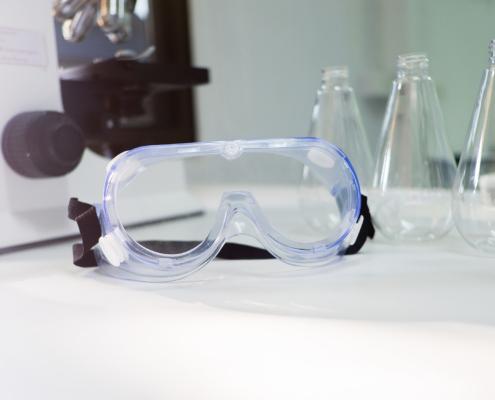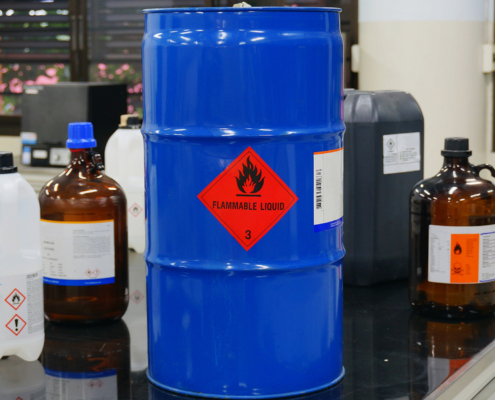
Everything You Need To Know About Chemical Handling Safety
Working in the chemical industry requires special attention to safety. Chemical handlers must understand the risks of working with hazardous chemicals and how to handle them safely.
In this article, we’ll discuss what can happen if employees are exposed to hazardous chemicals, tips for chemical handling safety, and helpful products from experts like Axiom.
The Importance of Chemical Handling Safety
Chemical handling safety is essential for any workplace that deals with hazardous chemicals. Improper storage and handling of these materials can be dangerous or even deadly, so it’s vital to make sure staff members understand the risks associated with their work and are equipped to handle these substances safely.
What Can Happen if Employees Are Exposed to Hazardous Chemicals?
Any chemical that can potentially cause harm is hazardous. These chemicals exist in a variety of forms and enter the body in the following ways:
- Inhalation: Breathing in contaminated air is the most common way chemicals enter the body.
- Skin contact: Some substances are absorbed into the body through the skin.
- Ingestion: Workplace chemicals can be accidentally swallowed if food or hands are exposed.
- Injection: Sharp objects can inject harmful chemicals into the bloodstream.
The effects of chemical-related accidents are devastating for workers, their families, and coworkers. Here are a few things that can happen if employees are exposed to hazardous chemicals:
- Immediate symptoms such as dizziness, nausea, skin irritation, and respiratory problems
- Long-term health effects such as cancer, organ damage, and neurological disorders
- Increased risk of accidents and injuries due to impaired physical and mental function
- Potential harm to the environment, including pollution of air, water, and soil
- Increased risk of fires or explosions due to the flammability or reactive properties of certain chemicals
- Damage to equipment or property due to corrosive or destructive properties of certain chemicals
- Increased risk of liability and legal action if proper safety protocols and regulations are not followed
- Decreased employee morale, productivity, and attendance due to fear or illness caused by exposure to hazardous chemicals
- Negative impact on the company’s reputation and ability to attract and retain employees if safety concerns are not addressed.
Are you looking for a chemical handling safety PPE gear supplier for your business? Check out the products we offer today at Axiom:
Chemical Handling Safety Tips
Proper storage and handling techniques are key to keeping workers safe from harm, so employers must provide clear guidance on safely storing and handling hazardous chemicals in the workplace. Here are practical preventive measures for chemical handling safety:
Offer Proper Training
Train all incoming employees on standard operating procedures when handling dangerous chemicals. Teaching employees areas where hazardous chemicals are present helps prevent accidents. Remind them of the following:
- Exhaust from fuel-powered equipment
- Toxic gases from decomposing materials
- Hazardous liquids from spraying, grinding, or welding processes
Label Containers Clearly
Chemical containers often look identical, and properly labeling them minimizes the risk of critical mix-ups or improper disposal. Also, remember to place chemical safety data sheets in easily accessible areas; they provide information on chemical hazards, and employees should consult them before working.
Store Chemical Containers Safely
Safely storing all containers ensures that chemicals don’t sit near other chemicals, potentially allowing an adverse reaction. Placing containers in well-ventilated areas helps provide good air quality in the event of a spill.
Check Emergency Equipment
The Occupational Safety and Health Administration (OSHA) requires companies to have functioning emergency equipment available in buildings that store hazardous chemicals. Recommended emergency equipment includes:
- Emergency eyewash station
- Fire extinguisher
- Local water source
Promote Cleanliness
Encourage employees to keep their workstations clean at all times. Cluttered work areas increase the chances of accidental spills. Providing workers with designated disposal areas helps them clean their workspaces and safely remove chemicals.
Use Proper Tools
Using damaged chemical decanting equipment is just as dangerous as using the wrong chemicals. Even a hairline crack in glassware increases the risk of spillage. Checking glassware and equipment before each shift and providing containment trays helps prevent chemical accidents.
Require Safety Gear
OSHA requires that all employees wear chemical safety PPE gear. Chances of chemical exposure increase when workers ignore rules, and keeping safety gear easily accessed places helps promote use.
Designate Safe Eating Locations
Eating and drinking around hazardous work areas increases the risk of accidental ingestion of chemicals and shouldn’t be allowed. Designate specific locations for eating, drinking, and breaks safely away from chemical storage areas and worksites. Installing handwashing stations near break areas helps employees wash chemical residue from their hands, preventing unwanted chemical ingestion.
Be Prepared for Accidents
Preparing for an accident is one of the most important chemical safety tips. Have a clearly defined chain of command to respond to emergencies in case there’s an accident. Also, make sure every employee knows the location of the following items:
- Telephones
- Emergency guides
- First-aid kits
You should also practice safety procedures with spill drills, so employees know what to do in case of an emergency.
Chemical Safety PPE Products
To protect themselves from exposure, workers must wear protective equipment such as gloves, eyewear, and respirators when handling hazardous materials. Employers should also provide training on the proper use of safety equipment and emergency response plans in case of a spill or accident involving chemicals. Outlined below are products that companies like Axiom provide:
Nitrile Chemical Safety Gloves
Our selection of nitrile gloves was designed to withstand regular use while delivering unmatched chemical resistance and performance. Our gloves are available in unlined and disposable options, resist punctures and abrasions, and work well with any equipment.
Jet Rinse Triple-Rinsing Nozzle
Our Jet Rinse Triple-Rinsing Nozzle is an ideal solution for any business that needs to rinse and dispose of chemical containers efficiently. Our innovative nozzle removes up to 99% of residue in less than one minute and features a sharp point water flow that easily punctures metal and plastic containers.
Chemical Safety Goggles
Axiom carries a wide selection of chemical safety PPE goggles that meet or exceed chemical handling safety standards. Our goggles are designed to be retail ready and feature the following benefits:
- Lightweight
- Durable
- Impact-resistant
Axiom Products: Your Trusted Source for Chemical Handling Safety
Chemical handling safety is essential for any workplace that deals with hazardous material. Employers can create a culture of safety by taking the right steps toward protecting workers from harm, such as investing in protective equipment, providing training on safe practices, and creating an effective emergency plan.
Axiom is proud to offer our Accu-Tech chemical safety equipment line that gives users everything they need to handle hazardous chemicals safely. Contact our team of experts today.





